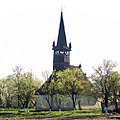Iclod (Cluj)
|
Iclod Nagyiklód |
||||
|
||||
| Basic data | ||||
|---|---|---|---|---|
| State : |
|
|||
| Historical region : | Transylvania | |||
| Circle : | Cluj | |||
| Coordinates : | 46 ° 59 ' N , 23 ° 48' E | |||
| Time zone : | EET ( UTC +2) | |||
| Height : | 268 m | |||
| Area : | 67.92 km² | |||
| Residents : | 4,263 (October 20, 2011) | |||
| Population density : | 63 inhabitants per km² | |||
| Postal code : | 407335 | |||
| Telephone code : | (+40) 02 64 | |||
| License plate : | CJ | |||
| Structure and administration (as of 2016) | ||||
| Community type : | local community | |||
| Structure : | Iclod, Fundătura , Iclozel , Livada , Orman | |||
| Mayor : | Emil Ioan Pîrțoc ( PSD ) | |||
| Postal address : | No. 440 / A loc. Iclod, jud. Cluj, RO-407335 |
|||
| Website : | ||||
Iclod (outdated Iclodul Mare ; Hungarian Nagyiklód or Iklód ) is a municipality in the Cluj County , in Transylvania , Romania .
Geographical location
The municipality of Iclod is located in the Somesch Highlands (Podișul Someșelor) in the north of the Transylvanian Basin on a total area of about 6800 hectares. The four villages are located two to nine kilometers from the community center. At the mouth of the Pârâul Mărului stream in the Gădălin - a right tributary of the Someșul Mic (Little Somesch) - is the place Iclod on the national road 1C and the Apahida – Dej railway eight kilometers southwest of the city of Gherla ( New Castle ) and about 35 kilometers northeast of the district capital Cluj-Napoca (Klausenburg) .
history
The place Iclod was first mentioned in 1320. In the 18th and 19th centuries, besides Romanian farmers and Hungarian noblemen, many Jews also lived here. To a settlement of the region in the Neolithic archaeological finds in the unincorporated village interpret Fundatura (Hungarian Szamosjenő ) on the site of the locals Poderei and Tabla Popii called, and in Livada (Hungarian Dengeleg ). Remains of a Roman fortification and a Roman road are also noted on the area of the incorporated village of Iclozel (Hungarian Kisiklód ) as well as in Livada.
In the Kingdom of Hungary , today's municipality belonged to the Szamosújvár chair district in the Szolnok-Doboka County , then to the historical Someș district and, from 1950, to today's Cluj district.
population
The population of the municipality developed as follows:
| census | Ethnic composition | ||||
|---|---|---|---|---|---|
| year | population | Romanians | Hungary | German | other |
| 1850 | 3,026 | 2,503 | 302 | - | 221 |
| 1920 | 4,062 | 3,551 | 351 | 3 | 157 |
| 1977 | 5,799 | 5,615 | 182 | 1 | 1 |
| 2002 | 4,420 | 4,204 | 113 | 1 | 102 |
| 2011 | 4.263 | 3,874 | 97 | 2 | 290 |
Since 1850 the highest number of inhabitants and also that of the Romanians in 1977 was determined in the area of today's municipality. The highest population of the Magyars (973) was registered in 1941, the Roma (100) in 2002 and that of the Romanian Germans (154) in 1890.
Attractions
- The Greek Catholic Church Înălțarea Domnului , built in 1791, is a listed building.
- In the incorporated village of Orman ( Ormány in Hungarian ) the Orthodox church , built in 1866, was renovated in 1963.
- The ruins of the reformed church built in Orman in the 13th century and the bell tower in the 18th century are poorly covered and are under monument protection.
Web links
Individual evidence
- ↑ 2011 census in Romania ( MS Excel ; 1.3 MB)
- ↑ Heinz Heltmann, Gustav Servatius (Ed.): Travel Guide Siebenbürgen . Kraft, Würzburg 1993, ISBN 3-8083-2019-2 , p. 517 .
- ↑ Institute Of Archeology - Fundatura (Romanian) accessed on November 7, 2017
- ↑ a b c List of historical monuments of the Romanian Ministry of Culture, updated 2015 (PDF; 12.7 MB; Romanian)
- ^ Institute Of Archeology - Livada (Romanian). Retrieved November 7, 2017
- ↑ Institute Of Archeology - Iclozel (Romanian) accessed on November 7, 2017
- ↑ Censuses 1850–2002, last updated November 2, 2008 (Hungarian; PDF; 1 MB;)
- ↑ Information on the Greek Catholic Church in Iclod at biserici.org (Romanian), accessed on November 6, 2017
- ↑ Information on the Orthodox Church in Orman at biserici.org (Romanian), accessed on November 6, 2017
- ↑ Information on the church ruins in Orman at biserici.org (Romanian), accessed on November 6, 2017






